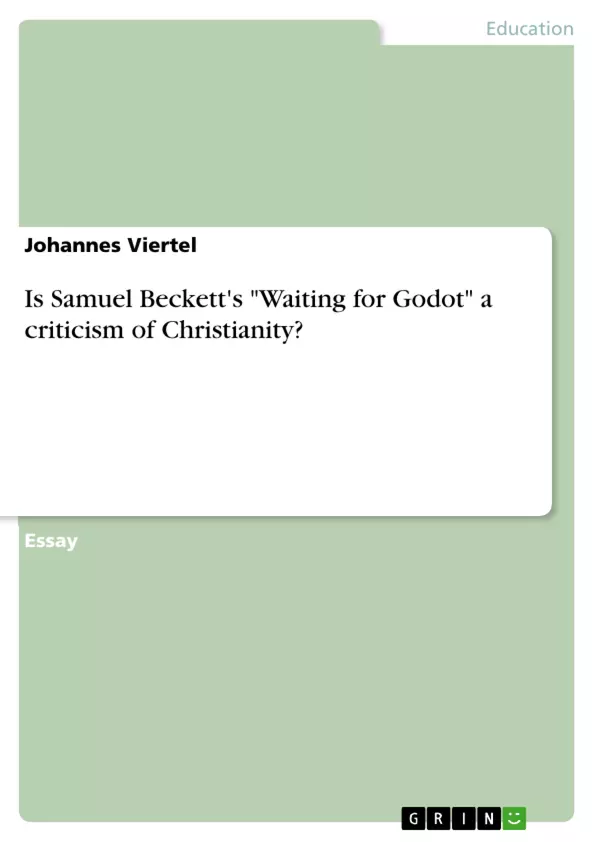In this essay care is taken specifically to the role and the criticism of Christianity. Since many studies came to the conclusion that the piece deals mainly with the topic of Christianity, with large influxes of philosophy and existential questions, a broad range of theories and conjectures has developed in this regard. In the course of this work I will first give a general overview of the most important references and criticisms of Christianity, oriented to the text, will then have a closer look at the role of Pozzo and Lucky and will present my conclusion at the end.
The play “Waiting for Godot” premiered 1953 and was written by the Irish novelist Samuel Beckett. It is divided into two acts and the main characters, two old men called Vladimir and Estragon, wait on a lonely country road for a man called Mr. Godot. While waiting they are talking, one could say speculate, about that person, contemplate suicide several times, talk about religion and meet several characters but neither of these is Mr. Godot. This was just a very simple representation of events, another response of what happens might be “it depends what you mean by “happen””.
In the fifty years since the plays publication many authors have tried to determine the meaning of this play. It seems like there is no specific meaning behind the text and that a new meaning is created each time the text is read. Therefor the text invites the reader to search for an interpretation, a meaning, a sense or message, even though it is not immediately visible. One thus has to accept that there is no right or wrong, only an assumption.
With this knowledge it is possible to examine the text at various levels, such as political, religious, biographical, psychoanalytical or even existential.
Table of Contents
- Samuel Beckett's „Waiting for Godot“ – A short introduction.
- References and criticisms of Christianity
- Role-analysis of Pozzo and Lucky
- Conclusion.
Objectives and Key Themes
This essay aims to examine the role of Christianity in Samuel Beckett's play "Waiting for Godot". It focuses on references to and criticisms of Christian themes within the text, particularly in the characters of Vladimir and Estragon.
- The significance of the "wait" and its relation to Christian faith.
- The play's exploration of the human condition and its connection to religious belief.
- Parodic and satirical elements within the play, particularly regarding religious doctrines.
- The role of characters like Pozzo and Lucky in the play's exploration of religious themes.
- The ambiguity of meaning and interpretation in the play, inviting readers to engage with the text in a personal and reflective way.
Chapter Summaries
- Chapter 1: Samuel Beckett's „Waiting for Godot“ – A short introduction
- Chapter 2: References and criticisms of Christianity
This introductory chapter provides a brief overview of the play's characters, setting, and themes. It highlights the ambiguity of meaning and interpretation within the text, inviting readers to search for their own understanding.
This chapter delves into the play's religious allusions, exploring the connection between Godot and the concept of God. It examines the significance of the "wait" in the context of Christian faith, highlighting potential criticisms of religious beliefs and practices. Key elements discussed include the tree as a symbol of Christ's cross, the opening conversation between Vladimir and Estragon regarding the biblical thief, and the parody of confession and absolution.
Keywords
The essay focuses on the exploration of Christian themes in Samuel Beckett's "Waiting for Godot", including the concept of the "wait", the ambiguity of faith and religious doctrine, and the portrayal of characters like Pozzo and Lucky as representing various religious figures. Other key themes include existentialism, the human condition, and the nature of meaning and interpretation in literature.
Frequently Asked Questions
Does "Waiting for Godot" criticize Christianity?
The essay explores whether the play is a criticism, highlighting various religious allusions, parodies of confession, and the ambiguous nature of faith.
What is the significance of the characters Vladimir and Estragon in a religious context?
They represent the human condition, constantly waiting for a savior (Godot), which mirrors the wait for divine intervention or the second coming of Christ.
What does the tree symbolize in the play?
In Christian interpretation, the tree is often seen as a symbol of Christ's cross, providing a focal point for the characters' suffering and hope.
How are Pozzo and Lucky analyzed regarding religion?
The essay analyzes their roles as potential representations of religious figures or the master-slave dynamic within religious structures.
Is there a definitive meaning to "Waiting for Godot"?
Samuel Beckett's work is intentionally ambiguous, inviting readers to create their own meaning across religious, existential, or political levels.
- Quote paper
- Johannes Viertel (Author), 2015, Is Samuel Beckett's "Waiting for Godot" a criticism of Christianity?, Munich, GRIN Verlag, https://www.hausarbeiten.de/document/489457


